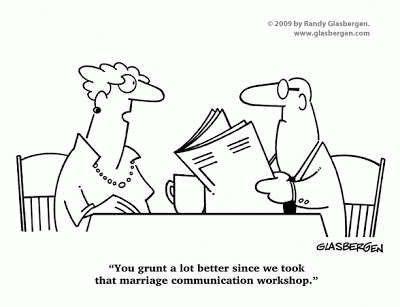If you're in a relationship, sometimes you probably feel like you're fighting a caged death-match with an invisible spider monkey. And the monkey is rabid. And you don't have any legs. And then a buffalo jumps in there and starts head-butting everything and your face catches on fire and there is a general atmosphere of chaos.Oh conflict.
-Hyperbole and a Half's relationship advice
Someone wrote to me recently, asking "my marriage is on the rocks, please help?"
"What is going on?" I asked.Conflict arises when something is wrong. (Duh, right?) But then why not just make it right?
"We're fighting too much. I get hot-headed and she turns cold just when I need compassion the most. We're just not getting through to each other. It's awful. We're at the end of our ropes."
 |
| Easier said than done. |
- The ability to manage your emotions
- The ability to communicate in a way that feels safe for your partner.
 |
| Don't do this. |
So, just ask for what you need, right? Or conversely, listen nicely?
But what if you don't WANT that stolen traffic light hanging over your marital bed? To compromise, you offer to give in as long as you can display your assorted toenail collection prominently on the mantle (I really did know someone who kept one in a paper bag so I'm not making that completely up) which seemed like a reasonable compromise at first, really, but now neither of you will budge, relent or detach.
A funny thing was discovered though, by Dr. Marriage (as I like to call Dr. Gottman, the marriage researcher who could predict which marriages were likely to fail). He found that when people brought up an issue of discontent, if it wasn't addressed, they didn't necessarily keep bringing it back up. They just stopped asking. They were still unhappy, they were just letting sleeping dogs lie.
| Real dogs are much cuter than the dogs of marital discontent. |
Now no one is talking and the issue gets buried and the couple disconnects.
There's a good reason people don't usually talk about their feelings though: they're worried it won't be received well. But emotions never politely dissipate; if something is wrong, it's not going to go away. Learning to communicate how you feel in a way that is true to your authentic self and also nonthreatening to your partner is paramount to a happy union, and vice versa listening without making your partner scared to be vulnerable with you.
Some advice on where to start:
- How to be your mate's best friend: http://www.lovesciencemedia.com/love-science-media/how-to-be-your-mates-best-friend-1.html
- Communication skills: what to do when he or she won't talk to you: http://www.marriageadvocates.com/2012/04/14/communication-skills-what-to-do-when-he-she-wont-talk-to-you/
- Why the #1 Ingredient for a Happy Marriage Isn't Love
http://www.lovesciencemedia.com/love-science-media/why-the-1-ingredient-for-a-happy-marriage-isnt-love.html
Al Turtle calls this "lizard" mode.
 |
| My spirit animal. |
Humans (all animals, actually) are physiologically made for one purpose: to save our own lives. This means we are prepared, in the face of a threat, to respond in one of two ways: fight or flee. That's why those hormones get dumped into your system: so you can take down the saber toothed tiger or scale a tree to escape from the wolf.
However, this wonderful built-in defense is useless in a marital argument.
So in a fight, when you feel the tension rising and believe you're no longer in a good place for a productive discussion, give yourself at least 19 minutes away from the threat (the fight) so you can return and try talking again. When you walk away, help your body do what it started: walk, do some pushups, jog in place, whatever -- force your muscles to use up that energy they've been pumped with.
Then once you calm down, ask yourself "what is the longing behind this argument?"
Your longing and your partner's longing is the core of the issue. It won't necessarily come out that way at first but that's why it's so important to uncover the real issue.
My partner and I once got into an enormous fight on a trip when I had to use the bathroom frequently. The real issue? Not that I had to disappear into a public restroom every 2 hours. The longing behind his complaint was that he felt lonely, like I was more preoccupied with the facilities than sharing the day with him. There is often the fight, and then there is the real issue underneath.
For a good article on marital boundaries, read:
- Boundaries in marriage: http://www.marriageadvocates.com/2012/07/16/boundaries-in-marriage-part-i-couples-in-intimate-relationships/
- Five Ways to End a Fight: http://www.psychalive.org/5-simple-steps-end-fight/
A common problem is learning how to manage emotions. You feel something, and you're probably not lame so you happen to feel it very intensely, but the intensity is too much to handle.
 |
| This guy is hot! |
Then, when you are ready to talk with your partner, try a new approach.
I like "nonviolent communication" because it encourages self-expression without the kind of reactivity that can trigger a partner to shut down. I don't necessarily like the label because it sounds like communication must be either violent or not, but that's not true, it's just a technique to talk without activating your partner's "lizard."
- How to practice Nonviolent Communication: http://www.wikihow.com/Practice-Nonviolent-Communication
The premise is that everyone has a certain way they feel loved. If you want your partner to feel loved, you want to speak their love language.
The five languages are:
- Physical affection
- Gifts
- Effusiveness with words: telling people how much you appreciate them or what they did
- Quality time
- Acts of service: doing nice things for someone else like washing the dishes or having their car vacuumed or something.
One girlfriend did this with her husband and then suddenly understood why, when he had to work late and came home with flowers and an apology, that it didn't mean anything to her because her love language was quality time, and his was gifts. Neither of them felt loved by the other because they were expressing to the other how they wanted love expressed to them. Too often we do for someone else what we want done to us.
Now that you know your partner's love language, do another exercise:
- List 10 things that make you feel loved, and have them do the same.
Try to do at least 3 of the things on your partner's list every day. (It can be hard to do them all but aim for at least a few.)
If you're unsure whether you can save your relationship, I recommend: "too good to leave, too bad to stay" by Mira Kirshenbaum. Also, counseling is awesome. Best of luck in your marriage, I hope it works out.
Love,
Asplenia









Fantastic post!
ReplyDeleteThe person that sent you that email is lucky to know you.
This post is amazing! I never knew the 19 minute thing. Brilliant. Thanks so much for sharing, and I plan to pass it along to my hubs!
ReplyDeleteExcellent post! I really enjoyed doing the two writing/thinking exercises, too. They taught me a lot about myself. Hopefully, my husband will consent to do the exercises, too, so that we can work on our communication issues.
ReplyDelete